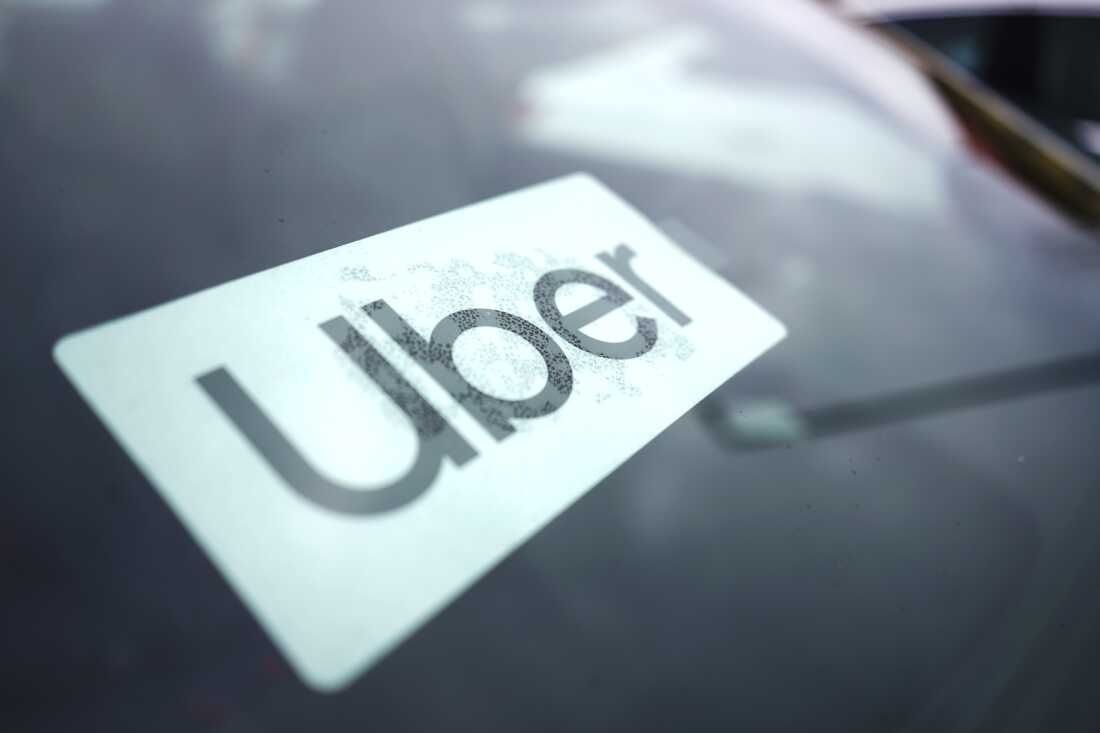
John and Georgia McGinty tried to sue Uber for financial compensation after suffering numerous serious injuries when their rideshare crashed into another car in early 2022.
Stark & Stark
hide caption
toggle caption
Stark & Stark
A New Jersey appeals court says a couple cannot sue Uber over a life-altering car accident because of the app’s terms and conditions, even though they say it was their daughter who agreed to them while placing an Uber Eats order.
John and Georgia McGinty — a Mercer County couple both in their 50s — filed a lawsuit against the ride-sharing company in February 2023, nearly a year after suffering “ serious physical, psychological, and financial damages” when the Uber they were riding in crashed into another car, according to court filings.
“There are physical scars, mental scars, and I don’t think that they will ever really be able to go back to their full capacity that they were at before,” says their attorney, Mike Shapiro.
Uber responded by filing a motion to dismiss the complaint and compel arbitration, which would require the parties to resolve their differences outside of court instead — ostensibly benefiting the company by lowering legal costs and keeping proceedings private.
It argued that Georgia McGinty, a longtime customer of Uber Rides and Uber Eats, had agreed to arbitrate any disputes with the company when she signed off on the language in the app’s terms of use on three occasions over the years.
The McGintys fought back, saying it was actually their daughter — who was and remains a minor — who had most recently agreed to the terms when she used Georgia’s phone to order food on their behalf. A lower court initially sided with the couple, denying Uber’s motion to compel arbitration in November 2023.
Uber appealed the decision, and late last month, the appeals court ruled in its favor.
“We hold that the arbitration provision contained in the agreement under review, which Georgia or her minor daughter, while using her cell phone agreed to, is valid and enforceable,” the three-judge panel wrote in September. “We, therefore, reverse the portion of the order denying arbitration of the claims against Uber.”
Shapiro tells NPR that the couple “100%” wants to keep pursuing their case and are mulling their options, including asking the trial court to reconsider it or potentially trying to bring it to the New Jersey Supreme Court.
“Uber has just been extremely underhanded in their willingness to open the same cabinets that they’re forcing the McGintys to open up and have to peek around in,” Shapiro says. “It’s unfortunate that that’s the way that they’re carrying on their business because this is truly something that subjects millions and millions of Americans and people all over the world to a waiver of their hard-fought rights.”
The case calls to mind another recent example of what Shapiro described as an “infinite arbitration agreement,” in which Disney tried to block a man’s wrongful death lawsuit on behalf of his wife — who died following an allergic reaction at a Disney World restaurant — because he had signed up for a trial of Disney+. The company backtracked on its push for arbitration after considerable media coverage and outcry.
When asked for comment about the McGinty case, Uber pointed to quotes from the court’s decision supporting that Georgia had agreed to its terms of use — including its arbitration agreement — on multiple occasions.
“While the plaintiffs continue to tell the press that it was their daughter who ordered Uber Eats and accepted the Terms of Use, it’s worth noting that in court they could only ‘surmise’ that that was the case but could not recall whether ‘their daughter ordered food independently or if Georgia assisted,’” the company added.
An Uber Eats dinner, a ‘T-bone’ car crash and lasting pain
Georgia McGinty originally signed up for an Uber account in 2015, and her account agreed to its updated terms of use two more times in April 2021 and January 2022, according to court filings.
Uber says all of those terms included language about arbitration, the most recent of which was a clause about any disputes arising between McGinty and Uber — including concerning auto accidents or personal injuries — being resolved through binding arbitration and “not in a court of law.”
But the McGintys say it was their daughter who clicked the “confirm” button in early 2022, while she was using her mom’s phone to order dinner for the family through Uber Eats as they packed for an upcoming ski trip.
Her parents say they don’t remember seeing the terms and conditions “clickbox” pop-up on the screen, or whether they helped their daughter with the order. They do recall her asking to order from a particular restaurant and “hanging on” to Georgia’s phone to monitor delivery updates after it was placed.
“Georgia argued she and John never had the opportunity to see the pop-up, and it was their daughter who intentionally or unintentionally clicked on it while monitoring the delivery,” the court opinion reads.
The appeals court, however, says it was Georgia who agreed to the arbitration provision, whether “by herself or through her daughter using her Uber account.”
Two months after that, in March 2022, the couple were riding in the backseat of an Uber ride-share when their driver ran a red light and T-boned another car, sustaining extensive damage.
John suffered a fractured sternum and severe fractures to his left arm and wrist, eventually undergoing a bone graft and continuing to experience “diminished use and sensation in his left wrist,” according to the court documents.
Georgia sustained cervical and lumbar spine fractures, rib fractures, a protruding hernia, traumatic injuries to her abdominal wall, pelvic floor and other physical injuries. She was forced to undergo numerous surgeries and invasive procedures, and was unable to return to her job as a matrimonial attorney until April 2023 — over a year after the accident.
Medical bills from the surgeries and doctor’s visits piled up, and Shapiro says the couple’s auto insurance couldn’t cover them because they were injured while traveling in an Uber.
They sued Uber to try to get compensation for the actual financial losses, including medical and childcare expenses and Georgia “essentially putting her law firm on pause.”
“Plus, the pain and suffering and degradation of going through this whole time period and now living with truly lifelong consequences,” he adds.
Some big questions: Was the language proper, and who actually agreed to it?

Uber argued the couple had agreed to its arbitration clause in the Uber Eats app, and an appeals court sided with the company last month.
Nam Y. Huh/AP
hide caption
toggle caption
Nam Y. Huh/AP
Shapiro says lawyers for Uber and the driver were initially cooperative, and all their experts “played nice together” while analyzing the vehicle, assessing data and sharing medical records.
But he says several months into the lawsuit, after the McGintys had given Uber all of the discovery materials it asked for, the company abruptly moved to go to arbitration. At that point, Shapiro says, Uber had not provided the material his team had asked for, particularly pertaining to how it collects and stores “clickbox” data.
Before the lower court even addressed those concerns, he says, it ruled that the arbitration agreement was invalid because the language was improper.
The original court found Uber had “fail[ed] to clearly and unambiguously inform plaintiff of her waiver of the right to pursue her claims in a judicial forum,” and that the updated agreement language “lacks any specificity on what the resolution would look like or what the alternative to such resolution might be,” court records show.
“Essentially, [the judge] said, ‘Look, there’s no magic words that are required, but you can’t have none of the language that’s used to enforce these arbitration agreements,’” Shapiro explains, pointing to examples like waiver, right, jury and litigation. “The way I describe it, you may not need magic words but you have to be speaking the same language.”
In their appeal, Uber countered that Georgia had formed “an enforceable arbitration with Uber” and “cannot escape her agreement with Uber by claiming that her daughter agreed to the December Terms on her behalf.”
The appeals court, after parsing the language of the multiple agreements and examining precedent, agreed with the company. The judges said they are “satisfied there is no ambiguity when Georgia agreed to resolve disputes related to Uber’s services by binding arbitration ‘and not in a court of law.‘”
And they said the McGinty’s statements about being preoccupied with packing, and their daughter being “capable” of frequently ordering food, supports “the interference that the daughter acted knowingly on Georgia’s behalf.”
Shapiro says the “most unfair” aspect of the appeals court’s ruling is that it essentially skipped the due process of requiring Uber to provide his clients with the technical information they requested about how those agreement pop-ups work.
The couple’s lawyer warns of a ’slippery slope’
Shapiro worries not only about his clients, but about the countless other people who might be affected by these kinds of arbitration agreements in previously unfathomable circumstances.
“It’s amazing to me the reach that these things are going to go to,” he says. “If you shop at a store, and you’re a member of their loyalty program, you’re gonna be agreeing to arbitration. If you’re on the street and you’re hit by an Uber, even though you’re not currently in it, but you’re an existing Uber customer, is that … the extent of the reach that they want to have their agreement hit?”
Shapiro points out that his law firm represents a different, Spanish-speaking client whose Uber app was set to Spanish — but had to sign the terms and conditions as they appeared in English, which he sees as a sign that the company is trying to push boundaries.
He says that until now, he’s only seen cases like this involving affiliated and subsidiary companies, where a client signs an arbitration with one business without knowing that others are involved.
But this Uber case, and the recent Disney suit, suggest to him that companies may increasingly be trying to get “entirely separate aspects of their enterprise” subject to arbitration clauses.
He’s careful to say he’s not accusing the courts of being complicit. But he does worry that rulings like this one are “evident of the sort of slippery slope in action, that companies like Uber are going to keep pressing the envelope.”
(Except for the headline, this story has not been edited by PostX News and is published from a syndicated feed.)





